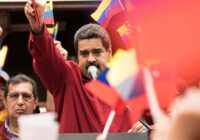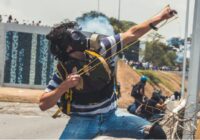Many analysts agreed that once the military withdrew support for the flailing regime in Caracas, the fall of Bolivarian socialism would be unavoidable, perhaps a matter of days or weeks.
Political analysts have been expecting Nicolás Maduro’s imminent downfall for quite some time now. Nonetheless, after years of massive waves of protest and more than three months of international recognition of opposition leader Juan Guaidó as interim president, Maduro remains in power in Caracas.
The Venezuelan crisis seems to be endless. Since its escalation in 2017, the news became almost apocalyptic: prolonged nationwide blackouts, people abandoning their pets and eating spoiled meat to survive, burying dead relatives in the backyard and even leaving newborns at orphanages, unable to care for them. According to a survey by the country’s three biggest universities, 90% of the population was living in poverty in 2017. On average, Venezuelans lost 11 kilograms in a year on the so-called Maduro diet. Some 60% of the interviewed have reported waking up hungry, and about 25% said they ate two meals or fewer a day.
This end-of-the-world scenario has forced some 3.4 million people to leave Venezuela, as per the latest figures by the United Nations Refugee Agency. This number could reach 5.9 at the end of 2019, as almost 5,000 people flee to neighboring Colombia every day. To make matters worse, about 13,000 doctors have also left the country in the last four years. The health system has collapsed, doubling cases of malaria and tripling incidences of HIV/AIDS, making up a “triple threat” with tuberculosis. But Maduro has refused all offers of humanitarian help, insisting that Venezuelans are not “beggars.”
A Hope Named Guaidó
Nicolás Maduro’s resistance is based in two main factors: support by the Venezuelan army, as well as Russia and China — the country’s biggest military supplier. When it comes to the military in Venezuela, there is a close relation with Maduro’s predecessor, Hugo Chávez. Under the former president — himself a career military officer — the army has grown in number as well as political prestige. The army began to occupy official positions and participate in the country’s strategic decisions. In 2017, 10 of the 32 cabinet members were active-duty, and two were retired military officers. Today, the armed forces still manage some of the country’s key industries, including the national oil company, PDVSA. This way, the regime has created a belt of protection for itself, ensuring military support.
Nonetheless, with the country plunging deeper into crisis, the conditions, especially for the military’s lower and middle ranks, have worsened. Maduro’s high command has created special units to stamp out anti-regime activities in the forces. Since then, hundreds of arrests and incidents of torture of soldiers and their relatives were registered.
In January, Juan Guaidó, a deputy elected in 2015 and president of the national assembly, declared himself interim president on the basis that Nicolás Maduro disrespected three articles of Venezuela’s constitution, which was drafted under Chávez. In the following days, more than 50 countries, including the United States and most of the European Union, recognized Guaidó as interim president, putting pressure on Maduro to step down. In South America, Colombia, Perú, Argentina and Venezuela’s biggest neighbor, Brazil, have recognized Guaidó.
Many analysts agreed that once the military withdrew support for the flailing regime, the fall of Bolivarian socialism would be unavoidable, perhaps a matter of days or weeks. Following international recognition of Guaidó as interim leader, over 300 members of the Venezuelan armed forces have deserted in a matter of days, many fleeing to Colombia and Brazil. It is not clear if there is a conflict between lower and upper ranks of the armed forces, but the desertions indicate that dissatisfaction among the officers is growing.
However, not everything was lost: Maduro found support from allies like Cuba, an old friend of chavismo, as well as Turkey, China and Russia endorsing the regime. In a demonstration of solidarity, Russia has sent military support in a clear message that an intervention from the United States would have consequences.
A Coup that Wasn’t
On April 30, Guaidó posted a video on Twitter of him surrounded by the military. The group, formed by dozens of unidentified soldiers, has also liberated Leopoldo López, a prominent opposition leader held under house arrest for the past two years. “Operation Freedom” has taken thousands to the streets, and the images of tanks trampling protesters have spread to the world.
However, it has not been enough to topple Maduro. At a parade organized “to reaffirm the absolute loyalty of the armed forces,” the embattled dictator talked directly to the military about loyalty. The fact that López was allowed to escape, however, shows that there are strong divisions in the armed forces. Guaidó admitted that the operation had failed, as most of the armed forces stayed loyal to Maduro, who still occupies his official residence at Miraflores Palace. Juan Guaidó is now considering asking for a US military intervention.
Since Guaidó’s international recognition, Maduro has decided against arresting him, as the regime has done with other opposition leaders. In this game of political chess, a direct action against Guaidó could mean a signal to military action from the international community. But, on the morning of May 9, Venezuelan intelligence agents arrested Edgar Zambrano, the national assembly’s vice president and Juan Guaidó’s right arm.
A Bigger Crack
At this point it seems unlikely that the United States, Russia and China would enter into a proxy conflict in Venezuela, but a belligerent outcome cannot be brushed away. As a result, Maduro could either be deposed immediately, or following a lengthy conflict. It is important to highlight that the country has the world’s biggest oil reserves, attracting many interests.
Russia, for example, has invested around $17 billion in Venezuela since 2005, especially through the state oil company Rosneft, in PDVSA. Maduro’s fall could represent difficulties in retrieving that investment. For Washington, a change of government in Caracas would be convenient for returning to cordial political relations with its main oil supplier. More than that, such a change would suit the United States politically, since Chávez and Maduro have been always aligned with Iran, Russia and China.
But Maduro could remain in the charge despite a lack of popular support internally while suffering external pressure, as he has done in the last few years. While it is difficult to imagine a continuation of the status quo, it is a feasible scenario.
Another possibility is that the regime loses power and collapses, which seems more likely at this point given the international political pressure as well as a new set of US sanctions imposed earlier this year, intent on starving the regime. Guaidó has confirmed that the opposition has been meeting clandestinely with the army high command. Leopoldo López sees Maduro’s weakness as “a crack that will become a bigger crack … that will end up breaking the dam.” Meanwhile, the Venezuelan nightmare seems to have no end.
The views expressed in this article are the author’s own and do not necessarily reflect Fair Observer’s editorial policy.
Support Fair Observer
We rely on your support for our independence, diversity and quality.
For more than 10 years, Fair Observer has been free, fair and independent. No billionaire owns us, no advertisers control us. We are a reader-supported nonprofit. Unlike many other publications, we keep our content free for readers regardless of where they live or whether they can afford to pay. We have no paywalls and no ads.
In the post-truth era of fake news, echo chambers and filter bubbles, we publish a plurality of perspectives from around the world. Anyone can publish with us, but everyone goes through a rigorous editorial process. So, you get fact-checked, well-reasoned content instead of noise.
We publish 2,500+ voices from 90+ countries. We also conduct education and training programs
on subjects ranging from digital media and journalism to writing and critical thinking. This
doesn’t come cheap. Servers, editors, trainers and web developers cost
money.
Please consider supporting us on a regular basis as a recurring donor or a
sustaining member.
Will you support FO’s journalism?
We rely on your support for our independence, diversity and quality.







